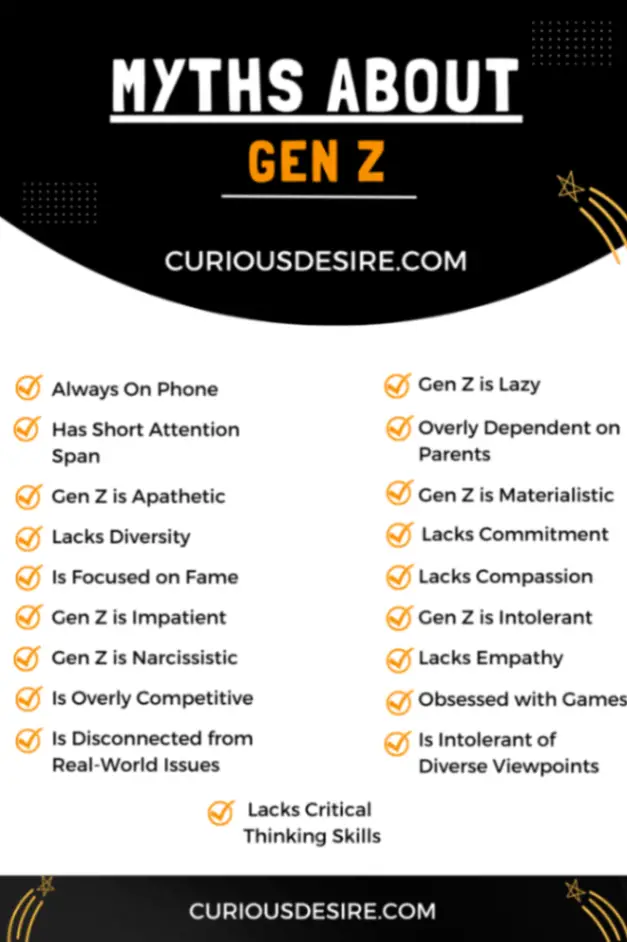As technology continues to advance and society rapidly evolves, a new generation emerges – Gen Z.
As the first true digital natives, they are shaping the cultural landscape in unprecedented ways.
Gen Z is often heralded as both the architects of tomorrow and the enigmas of today.
However, amid the rapid changes in technology and societal norms, several myths and misconceptions about Gen Z have emerged.
In this blog, we’ll debunk some of the most common misconceptions surrounding this fascinating generation.
5 most common myths about Gen Z:
- Gen Z Is Always on Their Phones
- Gen Z is Lazy
- Gen Z Is Addicted to Social Media
- Gen Z Obsessed With Video Games
- Gen Z Is Overly Competitive and Cutthroat

Myth 1: Gen Z Is Always on Their Phones and Lacks Real Social Skills
There is a prevalent myth that Gen Z is constantly glued to their screens, navigating social media platforms at every opportunity, and therefore lacks real-world social skills.
While it’s true that members of Gen Z are digital natives and have grown up with smartphones and social media, this does not mean that they cannot engage in face-to-face interactions.
In reality, Gen Z values both online and offline relationships.
They have adapted their communication skills to thrive in a digital age, mastering the art of networking, building communities, and engaging with a diverse range of individuals across different platforms.
Gen Z is adept at fostering meaningful connections, both online and offline, and leveraging technology to enhance the relationships and causes they care about.
Myth 2: Gen Z is Lazy and Entitled
Contrary to the misconception that Gen Z is lazy and entitled, this generation is characterized by its strong work ethic, ambition, and desire to make a positive impact on society.
Gen Z individuals have witnessed economic instability, environmental challenges, and social injustices, which have fueled their determination to create change.
Many members of Gen Z are actively involved in
- Volunteering
- Advocating for social causes
- Pursuing entrepreneurship
Their entrepreneurial spirit, coupled with their practicality and resourcefulness, sets Gen Z apart as a generation that is not afraid to roll up their sleeves and work hard to achieve their goals and make a difference in the world.
Myth 3: Gen Z Has a Short Attention Span and Lacks Focus
While it is often assumed that Gen Z has a short attention span due to the constant influx of information and entertainment available at their fingertips, this does not accurately reflect their ability to focus and engage deeply with meaningful tasks.
Gen Z is adept at filtering out irrelevant information, multitasking, and processing information quickly, demonstrating high level of cognitive flexibility.
They have developed strategies to manage distractions and prioritize their time effectively to pursue their interests and goals.
Gen Z’s capacity to quickly adapt to changing environments and navigate diverse challenges demonstrates their resilience and ability to thrive in a fast-paced world.
Myth 4: Gen Z Is Apathetic and Disengaged From Societal Issues
Contrary to the belief that Gen Z is apathetic and indifferent to the world around them, this generation is deeply engaged in social, political, and environmental issues.
Gen Z individuals are passionate advocates for causes such as social justice, equality, climate change, mental health awareness, and more.
They use their voices and platforms to raise awareness, mobilize communities, and drive positive change.
Gen Z’s activism extends beyond social media posts and hashtags; they actively participate in protests, volunteer work, fundraising efforts, and advocacy campaigns to address systemic challenges and create a more equitable and sustainable future for all.
Myth 5: Gen Z Is Overly Dependent on Their Parents
While it is true that Gen Z values their relationships with their parents and seeks guidance from trusted adults, this does not mean they are overly dependent.
Gen Z is characterized by their independence, self-reliance, and ability to make informed decisions.
They understand the importance of seeking advice from a variety of sources, including peers, mentors, teachers, and online resources.
Gen Z values autonomy and the input of trusted adults in their lives to support their personal growth and development.
This generation is proactive in seeking out resources and opportunities to learn, grow, and succeed on their own terms.
Myth 6: Gen Z Is Materialistic and Only Cares About Brands
While it is easy to stereotype Gen Z as materialistic consumers who are solely focused on brand names and status symbols, this does not capture the complexity of their values and priorities.
Gen Z is a generation that values authenticity, sustainability, and ethical practices in the brands they support.
They are drawn to companies that demonstrate a commitment to social responsibility, environmental stewardship, diversity, and inclusion.
Gen Z is more likely to engage with brands that align with their values and beliefs, seeking out products and services that resonate with their sense of purpose and integrity.

Myth 7: Gen Z Is Homogeneous and Lacks Diversity
Gen Z is a diverse and inclusive generation that celebrates individuality, cultural differences, and diverse perspectives.
This generation comprises individuals from a wide range of backgrounds, identities, and experiences.
Gen Z is characterized by its embrace of diversity, equity, and inclusion, advocating for representation and social justice across various dimensions
They prioritize authenticity, empathy, and respect in their interactions with others, cultivating a sense of belonging and community that transcends traditional boundaries and stereotypes.
Myth 8: Gen Z Is Irresponsible With Money and Lacks Financial Literacy
Contrary to the misconception that Gen Z is irresponsible with money and lacks financial literacy, this generation demonstrates a keen awareness of financial management, budgeting, saving, and investing.
Gen Z has witnessed economic downturns, student loan debt crises, and housing market fluctuations, urging them to educate themselves on personal finance matters.
Many Gen Z individuals are proactive in learning about financial planning, retirement savings, credit management, and investment strategies to secure their financial future.
They leverage digital tools, online resources, and peer networks to gain financial knowledge and make informed decisions about their money.
Myth 9: Gen Z Is Addicted to Social Media and Experiences High Levels of Anxiety and Depression
While it is true that Gen Z is heavily engaged in social media and digital communication, this does not necessarily equate to addiction or negative mental health outcomes.
While some members of Gen Z may experience anxiety or depression, research suggests that social media use is not the sole cause of mental health issues.
Gen Z is proactive in seeking mental health resources, therapy, and support services to address their emotional well-being and cultivate resilience in the face of societal pressures and challenges.
Myth 10: Gen Z Is Disloyal and Lacks Commitment
The myth that Generation Z is disloyal and lacks commitment is a common misconception that arises from observations of their behavior in various aspects of life.
- Changing Employment Landscape: Gen Z has entered the workforce during a time of economic uncertainty and rapid technological change. Traditional notions of long-term employment with a single company have shifted, in part due to the rise of the gig economy and a greater emphasis on flexibility. Many Gen Z individuals prioritize opportunities for growth, development, and meaningful work over long-term job security.
- Brand Loyalty: Contrary to the perception of being disloyal to brands, Gen Z values authenticity, transparency, and social responsibility in the companies they support.
- Relationship Dynamics: In terms of relationships, Gen Z may approach dating and friendships differently than previous generations. They often prioritize personal fulfillment, compatibility, and mutual respect over societal expectations or traditional markers of commitment.
- Diverse Perspectives: It’s essential to recognize that not all members of Generation Z fit neatly into generalized stereotypes. Like any generation, Gen Z is diverse, with individuals who exhibit a wide range of values, beliefs, and behaviors.
Myth 11: Gen Z Is Solely Focused on Fame and Celebrity
While it’s true that some individuals within Generation Z may aspire to fame and celebrity status, it’s inaccurate to generalize the entire generation in this way.
Like any generation, Gen Z comprises a diverse range of interests, passions, and aspirations.
While social media platforms may amplify the visibility of celebrity culture, many Gen Zers are more focused on making meaningful contributions to society, pursuing education, building careers, and engaging in creative or entrepreneurial endeavors.
Moreover, a significant portion of Gen Z is actively involved in social justice movements, environmental activism, and community service, demonstrating a desire to make a positive impact beyond the allure of fame and recognition.
Myth 12: They Are Disconnected From Real-World Issues
On the contrary, Generation Z is arguably one of the most socially aware and politically engaged generations in recent history.
Many Gen Zers are deeply committed to addressing real-world issues such as climate change, racial inequality, gender equality, and mental health stigma.
They harness the power of social media and digital platforms to raise awareness, advocate for change, and hold institutions accountable.
Gen Z’s emphasis on authenticity and transparency often translates into a desire to engage with real-world issues in meaningful ways, whether through grassroots activism, community organizing, or philanthropy.
Myth 13: Gen Z Is Impatient and Expects Instant Gratification
While technology has undoubtedly accelerated the pace of information and communication, it’s unfair to characterize an entire generation as universally impatient.
Like previous generations, Gen Z values efficiency and convenience but understands the importance of perseverance, resilience, and delayed gratification.
Growing up in a digital age where instant access to information is the norm, they may be accustomed to quick responses and immediate feedback.
However, this does not necessarily translate into impatience in all aspects of life.
Many Gen Zers are willing to put in the hard work and dedication required to achieve their long-term goals, whether in education, career, or personal relationships.
Myth 14: Gen Z Obsessed With Video Games
While it’s true that video games are a popular form of entertainment among many members of Generation Z, it’s inaccurate to claim that all Gen Zers are obsessed with them.
Like any generation, Gen Z is diverse, with a wide range of interests and hobbies.
While some individuals may enjoy gaming as a pastime, others may prefer other activities such as sports, music, art, or outdoor adventures.
Many Gen Zers are highly engaged in academic pursuits, extracurricular activities, and social causes, demonstrating that their interests extend far beyond the realm of video games.

Myth 15: Gen Z Is Intolerant of Diverse Viewpoints
This myth stems from the perception that Generation Z’s exposure to social media and cancel culture has led to a lack of tolerance for differing opinions.
- Cultural Context: Generation Z has grown up in a rapidly changing world characterized by globalization, social media, and political polarization. While they are more exposed to diverse viewpoints than any previous generation due to the proliferation of digital media, they are also navigating an increasingly fragmented and polarized information landscape.
- Social Justice and Activism: Generation Z is known for its strong commitment to social justice issues, including racial equality, LGBTQ+ rights, gender equality, and environmental sustainability. While their activism is often celebrated, it can sometimes be misconstrued as intolerance towards differing perspectives.
- Critical Thinking and Empathy: Contrary to the stereotype of intolerance, Generation Z is characterized by its critical thinking skills and empathy towards others. Many Gen Zers are adept at navigating complex issues, questioning societal norms, and engaging in thoughtful discourse.
- Individual Variation: While some individuals may exhibit intolerance towards opposing perspectives, others may embrace diversity and engage in meaningful dialogue with those of different opinions. It’s crucial to avoid painting an entire generation with a broad brush and instead recognize the individuality and complexity of each Gen Zer.
Myth 16: Gen Z Is Self-Absorbed and Narcissistic
This myth is often perpetuated by stereotypes about Generation Z’s use of social media and digital technology for self-expression and self-promotion.
However, research suggests that Gen Z is more altruistic and socially conscious than previous generations.
They are deeply committed to making a positive impact on their communities and the world at large, engaging in activism, volunteerism, and philanthropy.
While social media may play a role in shaping their identities and self-image, it does not define their values or character.
Myth 17: Gen Z Is Overly Influenced by Peer Pressure
While peer influence is a natural part of adolescence, it’s unfair to characterize Generation Z as overly susceptible to peer pressure.
Like previous generations, Gen Z seeks validation and acceptance from their peers, but they are also independent thinkers capable of making their own decisions.
With access to vast amounts of information and diverse perspectives online, many Gen Zers are empowered to form their own opinions and beliefs.
They are more likely to prioritize authenticity and individuality over conformity, celebrating differences and embracing their unique identities.
Myth 18: Gen Z Lacks Critical Thinking Skills
This myth often arises from the perception that Generation Z’s constant exposure to digital media and information overload hinders their ability to think critically.
Research suggests that Gen Z is adept at navigating complex information environments and possesses strong critical thinking skills.
Growing up in the digital age, they have access to a vast array of resources and perspectives, which can enhance their ability to analyze and evaluate information critically.
Gen Z is known for its resourcefulness, curiosity, and willingness to challenge conventional wisdom, demonstrating an aptitude for critical thinking.
Myth 19: Gen Z Lacks Empathy and Compassion
Contrary to this myth, Generation Z is characterized by empathy and compassion towards others.
They have grown up in a world marked by social and environmental challenges, leading many Gen Zers to develop a strong sense of social responsibility and a desire to make a positive difference.
From advocating for social justice and environmental sustainability to supporting mental health awareness and LGBTQ+ rights, Gen Z is actively engaged in addressing pressing issues facing society.
Their exposure to diverse perspectives and experiences online has contributed to their ability to empathize with others and understand different points of view, fostering a culture of inclusivity and compassion.
Myth 20: Gen Z Is Overly Competitive and Cutthroat
While competition is a natural part of human interaction, the perception that Generation Z is overly competitive and cutthroat is a myth.
Gen Z encompasses a spectrum of personality traits and behaviors like any generation, including competitiveness.
However, research suggests that Gen Z values collaboration, teamwork, and community over individual success.
They recognize the importance of collective action in tackling shared challenges and are more likely to collaborate with others to achieve common goals.
Moreover, Gen Z’s emphasis on authenticity and transparency fosters a culture of cooperation and mutual support, where success is not defined solely by individual achievement but by collective progress and well-being.
Conclusion
Gen Z is a vibrant and diverse generation that is breaking stereotypes and uniquely reshaping the world.
It is a multifaceted generation that defies stereotypes and challenges misconceptions through its resilience, innovation, and commitment to social change.
By debunking these myths and understanding the reality of Gen Z, we can better appreciate and support this influential generation as they continue to make their mark on society
Let’s recognize the potential of Gen Z to drive positive change and shape a more inclusive and equitable world for generations to come.